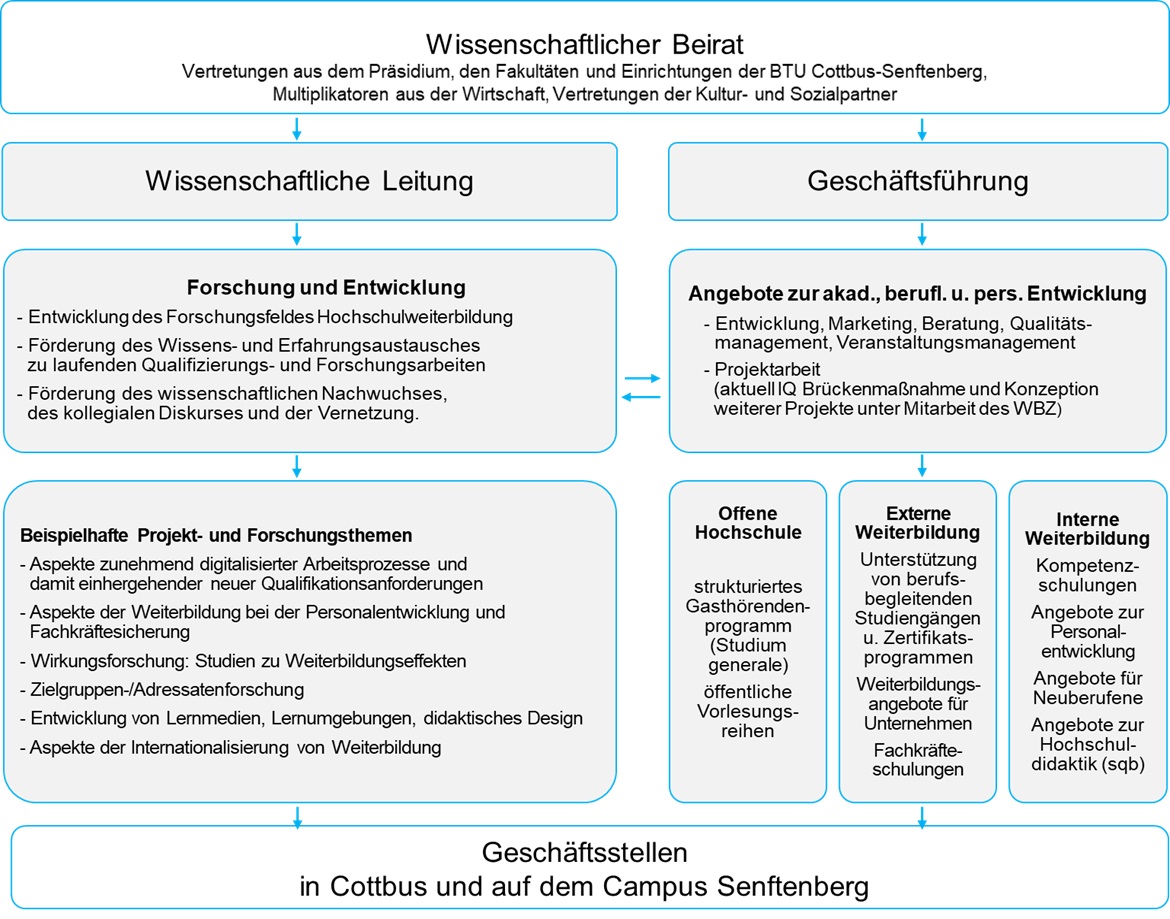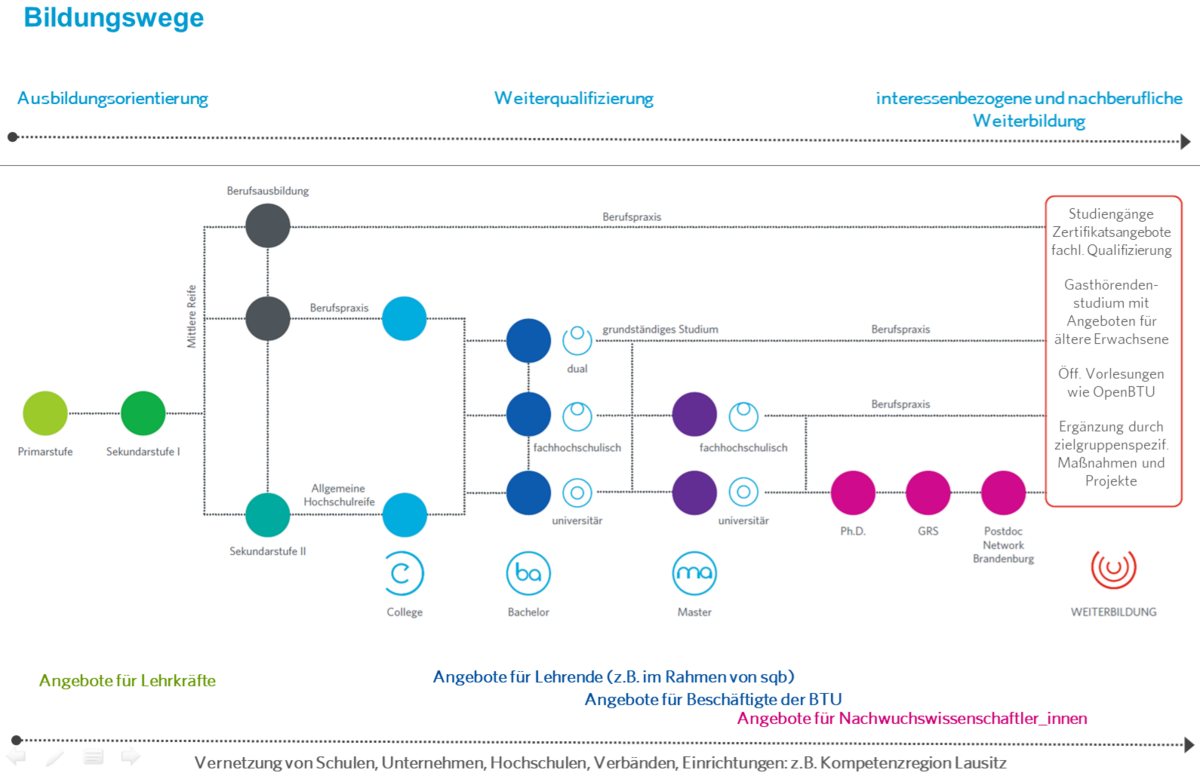
Organization and structure
On January 01, 2019, the Centre for Continuing Education was established as an institution at BTU Cottbus-Senftenberg in teaching building 10. This consistent next step in the implementation of the legal mandate for the more intensive integration of academic continuing education at the BTU was prepared and discussed throughout the university. The ZWW assumes the tasks of continuing education in the sense of lifelong learning at the interfaces of university and professional practice (cf. Establishment Resolution Art. I Para. 1).

As a central scientific institution, the ZWW has an intensive research and development component. It works in close coordination and cooperation with the university bodies, faculties, institutes, external cultural and social partners and is accompanied by a scientific advisory board.
- Ensuring accompanying research and participation in scientific discourse
- Testing and implementation of new, also digitally supported teaching and learning scenarios
- Submitting or participating in research proposals
- Local, regional and international collaboration and networking with stakeholders in various formats such as collegial exchanges. Conferences or meetings
- Providing administrative support to the chairs of the BTU in the design and program management of extra-occupational or continuing education study programmes and certificate programmes, trainings and modular training courses.
- Design and management of continuing education programs offered by the ZWW according to need and demand
- Raising third-party funds to ensure quality, organization, development of new offerings
According to the establishment resolution, point II Structure (5), the ZWW is advised by a scientific advisory board on fundamental and higher education policy issues in the area of continuing education, on program strategy and development. Professors from all BTU faculties and colleagues from relevant institutions of the BTU as well as multipliers from the economy and from the Ministry of Economy, Labor and Energy of the State of Brandenburg as well as external experts from science could be won for a profitable composition of the advisory board, which was appointed by the Senate of the BTU on September 10, 2020 for a period of four years.
The advisory board members will meet at least once a year. Further cooperation will also be coordinated via the Moodle platform .
Advisory Board members
| 1 | BTU | Vice-President for Academic Affairs | Prof. Dr. habil. | Peer | Schmidt |
| 2 | BTU | Chancellor of the BTU | Alfred | Funk | |
| 3 | BTU | Head of VB Personnel | Alexander | Bobusch | |
| 4 | BTU | Head of the IKMZ | Dr. phil. | Claudia | Börner |
| 5 | BTU | Faculty 1, Cyber Security | Prof. Dr.-Ing. | Andriy | Panchenko |
| 6 | BTU | Faculty 2, Molecular Cell Biology | Prof. Dr. rer. nat. habil. | Jan-Heiner | Küpper |
| 7 | BTU | Faculty 3, Factory Planning and Operation | Prof. Dr.-Ing. | Peggy | Näser |
| 8 | BTU | Faculty 4, Special and Remedial Education, Focus on Professional Integration and Human Resource Development | Prof. Dr. | Marina | Ney |
| 9 | BTU | Faculty 5, ABWL, in particular Planning, Innovation and Start-up | Prof. Dr. rer. pol. habil. | Magdalena | Mißler-Behr |
| 10 | BTU | Faculty 6, Structural Analysis and Dynamics | Prof. Dr.-Ing. | Wolfgang | Dornisch |
| 11 | BTU | Faculty of Health, Co-opted | Prof. Dr. rer. nat. habil. | Jan-Heiner | Prof. Küpper |
| 12 | MWAE | Head of Department 5 Labor, Skilled Workers, European Structural Funds | Dr. | Friederike | Haase |
| 13 | WFBB | Project Manager Team WFBB Labor - Skilled Workers & Qualification Division Labor, Energy, Start-up & Internationalization | Katja | Bolz | |
| 14 | Macromedia University | Professorship Media Management Member of the DGWF regional group Berlin Brandenburg | Prof. Dr. | Annette | Ostrich |
| 15 | UNISS | DAAD Visiting Professorship SRH University of Applied Sciences Berlin Titular Professor at the University of Sancti Spíritus Cuba | Prof. Tit. Dr. C. Ing. | Osvaldo | Romero |

